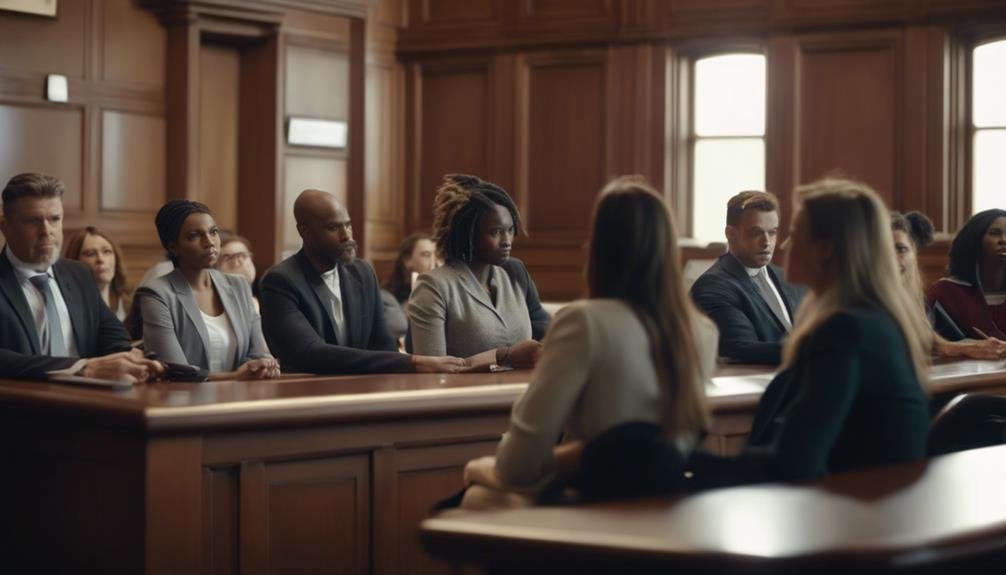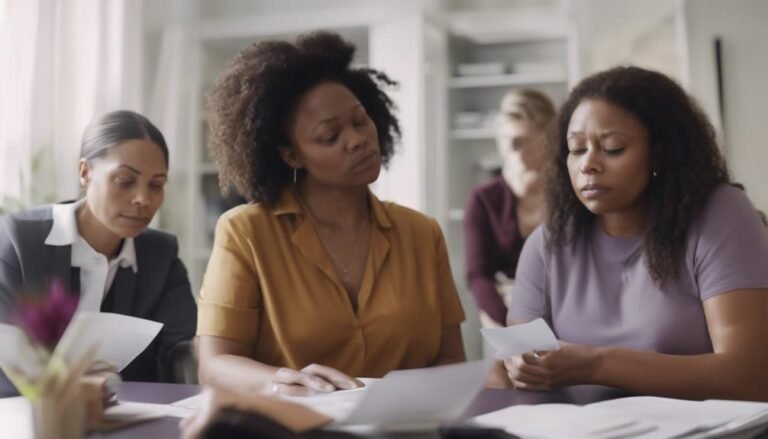For domestic violence victims, legal aid services offer essential help. You can receive free representation, obtain protective orders, and address custody concerns. Knowledgeable staff attorneys support you through the legal process. You also gain access to counseling and financial assistance. The aim is to protect your rights in court. If you seek assistance in understanding the legal system, dedicated support is available.
Key Takeaways
- Free legal representation for domestic violence victims
- Assistance with protective orders, child custody, and support
- Empowerment through knowledgeable staff attorneys specialized in family law
- Access to counseling, financial assistance, and education/training funds
- Support in navigating court proceedings and understanding legal rights
Legal Aid Services Overview
When seeking legal aid services for domestic violence victims, you’ll find a diverse range of support options available to assist you in understanding the legal system effectively.
Legal aid services for domestic violence victims encompass a wide array of assistance, including free legal representation for matters such as obtaining protective orders, addressing child custody concerns, and seeking financial support. These services are designed to empower victims by providing them with knowledgeable staff attorneys who specialize in family law and are dedicated to ensuring that the rights of victims are protected in court proceedings.
In addition to legal representation, victims can access supportive services like counseling, financial assistance, and education/training funds to help them rebuild their lives.
Protection From Abuse Orders
Protection From Abuse Orders, commonly known as restraining orders, are essential legal tools that provide indispensable protection for victims of domestic violence. In Pennsylvania, victims of domestic violence can turn to these legal orders to safeguard their safety and well-being.
These court-issued orders can prevent abusers from contacting or being near the victim or their children, offering a critical layer of protection. The process for obtaining a Protection From Abuse Order typically involves filing a petition with the court, attending a hearing, and presenting evidence of the abuse suffered.
It’s important to remember that these orders are enforceable by law enforcement, meaning that any violations by the abuser can lead to serious legal consequences.
If you or someone you know is experiencing domestic violence, seeking a Protection From Abuse Order could be a vital step towards ensuring safety and breaking free from the cycle of abuse.
Laws and Rights Awareness
Understanding the laws and rights concerning domestic violence is essential for empowering victims to navigate the legal system effectively and seek the necessary protection and support. Legal aid for domestic violence victims includes awareness of laws related to protection orders, divorce, child custody, and support.
By being aware of these legal rights, victims can make informed decisions about their safety and legal options. Legal aid organizations play a vital role in providing information and resources to educate victims about their rights and available legal protections.
Knowing the laws surrounding domestic violence not only helps victims advocate for themselves but also enables them to seek justice. By increasing awareness of legal rights in cases of domestic violence, victims are better equipped to protect themselves and their families.
It’s important to stay informed about the laws that exist to promote your safety and well-being in situations of domestic violence.
Assistance in Leaving Abusive Relationships
To break free from an abusive relationship, legal aid for domestic violence victims offers vital support in creating a safety plan and taking steps towards leaving the harmful situation. This assistance is essential for survivors seeking to leave abusive relationships.
Legal aid organizations provide guidance on protective orders, custody arrangements, and other necessary legal steps. They often collaborate with domestic violence hotlines and support services to make sure survivors have access to thorough help.
By offering resources and support, these organizations empower survivors to navigate the process of leaving an abusive relationship safely. They can connect individuals with legal representation, help them outline safety plans, and provide assistance in understanding their rights.
If you or someone you know is in an abusive situation, reaching out for legal assistance can be the first step towards a safer and healthier future. Remember, you aren’t alone, and support is available to help you through this challenging time.
Support in Navigating Legal System

Understanding the legal system can be overwhelming, but with the support of AVDA’s legal aid program, victims of domestic abuse in Harris County receive essential guidance and representation. AVDA provides free legal representation by staff attorneys to assist victims with matters such as protective orders, divorces, child custody, and support.
Currently, AVDA’s attorneys are actively representing over 200 victims in Harris County Family Courts, ensuring that victims have the necessary legal support during challenging times. In addition to legal representation, AVDA offers supportive services like counseling, financial assistance, and education/training funds to empower victims further.
Frequently Asked Questions
What Is the Income Limit for Legal Aid in Texas?
In Texas, there are no income limits for legal services related to domestic violence situations. Texas residents seeking legal representation for domestic violence cases can access legal assistance regardless of their financial eligibility, ensuring access to justice.
Conclusion
In summary, legal aid services for domestic violence victims offer essential support and guidance in maneuvering the complex legal system.
By providing assistance with protection orders, educating on laws and rights, and aiding in leaving abusive relationships, these services play a significant role in empowering survivors.
Remember, in the face of adversity, you aren’t alone – seek out the resources and support available to you to guarantee your safety and well-being.







